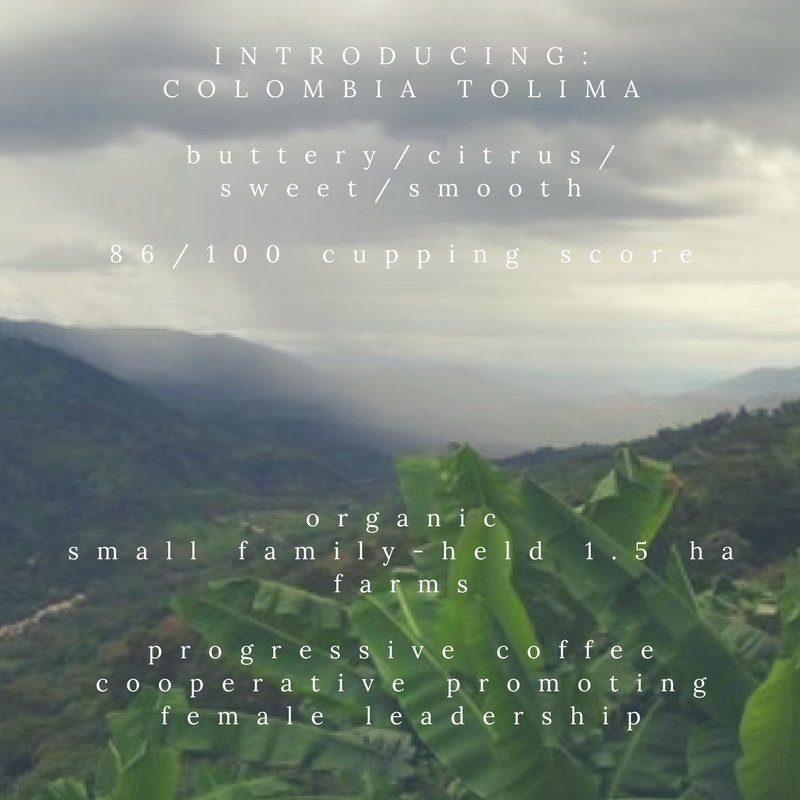

· By Trevor Huggins
Why We are Roasting Colombian Tolima Organic Coffee
We decided to add a bean from one of the world's great coffee producing countries in January 2018 after hearing incredible things about the 2017 harvest of this creamy profile coffee.
The tolima coffee is described as having a toffee or buttery start, clean citrus taste (citric notes if you want to sound fancy) & lingering sweet finish of caramel.
Our importers/brokers like to call this "a juicy big mug coffee" - you'll want it in a nice big mug.
This lot cups at 86 points (cupping is a standardized way of evaluating and assessing coffee, done by certified professionals called Q Graders.)
Side note on cupping:
Coffees are scored in ten different areas, and 100 represents the perfect cup of coffee. Over five cups of coffee (!) graders taste for the following 10 things:
- Fragrance and aroma (dry and wet)
- Flavor (first time you taste it when it’s hot)
- Aftertaste (after swallowing, retronasal)
- Acidity (after it cools slightly)
- Body
- Balance
- Uniformity cup-to-cup (Specialty coffee should always rank 10 here, otherwise docked points)
- Clean cup-to-cup (Specialty coffee should always rank 10 here, otherwise docked points)
- Sweetness cup-to-cup (Specialty coffee should always rank 10 here, otherwise docked points)
- Overall impression
-
The coffee world is laden with insider terms and language, which is intimidating, and our goal at Five'21 Roasters is to bring you excellent quality coffee that is accessible and enjoyable. In that spirit, with each of our posts we will give some basic explanations some of the terminology and demystify those fancy words you hear in the coffee world and see on labels.
-
These are called Excelso beans - which refers to the grading of these beans as exportable, and they are designated as EP (European Preparation.) IP involves hand sorting and inspecting beans. Excelso beans are slightly larger than supremo beans.
These beans hail from organic smallholder (family) farms that are all part of the ASEMPROGROPE producer association who came together in the early 2000s, in the mountains of Planadas, Tolima region. Each farm is about 1.5 hectares and grows usually at about 1400-1500 metres.
This small producer association (just over 30 members) offers organic and fair trade coffee. What we particularly like is that the president of this organization
is a woman focused on improving the participation of women in leadership positions within the organization, whose board of directors is 50% female.
These beans are hand washed, sun-dried on the patio (this drying process produces a nice fruity flavour) and sorted by hand. Sun-drying helps prevent fermentation and mould. This process takes about one week, as the bean goes from 60% moisture content to 11% moisture content.
We highly recommend this excellent article from Counter Culture Coffee if you'd like to learn a bit more about how your coffee goes from fruit to cup.
- #buttery coffee
- #calgary micro roasted beans
- #coffee beans calgary
- #colombia beans calgary
- #colombia coffee calgary
- #colombia tolima beans calgary
- #colombia tolima clagary
- #Colombian coffee calgary
- #colombian coffee roaster calgary
- #firefighter coffee
- #firefighter coffee roaster
- #firefighter coffee roaster yyc
- #five 21 roasters calgary
- #five 21 roasters yyc
- #five'21 roasters calgary
- #fresh coffee in calgary
- #fruity coffee
- #socially progressive coffee
- #toffee tasting coffee
- #yyc coffee
- #yyc coffee fans
- #yyc coffee roasters
- #yyc microroasted coffee
- #yyc organic coffee
